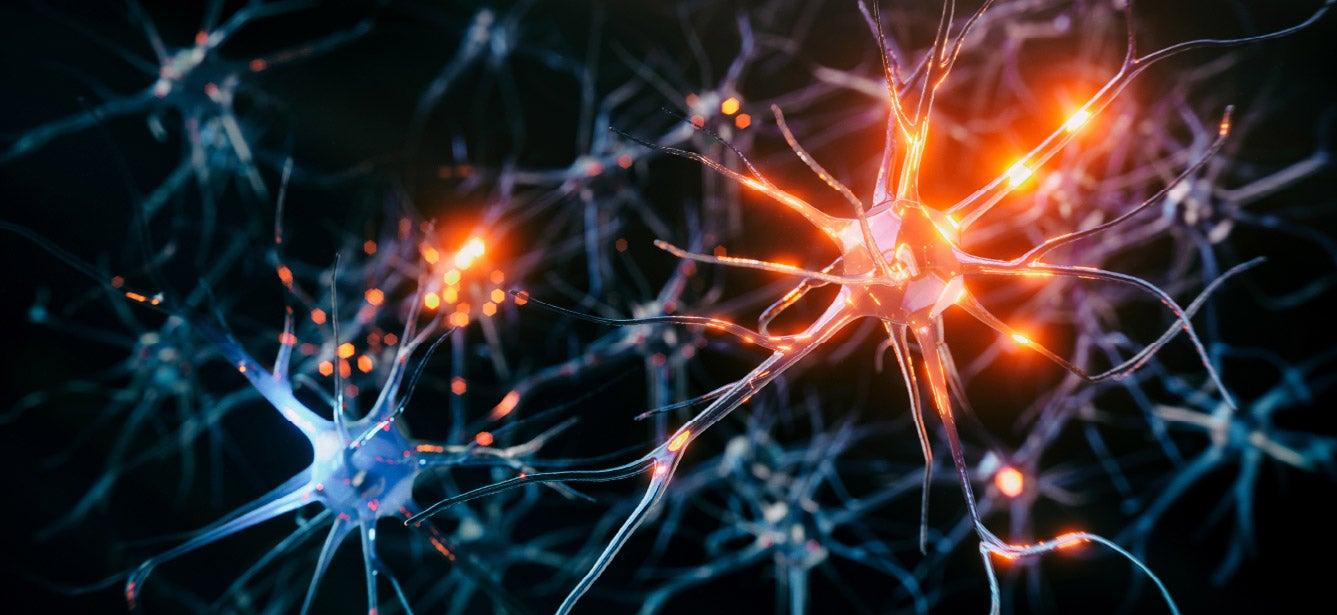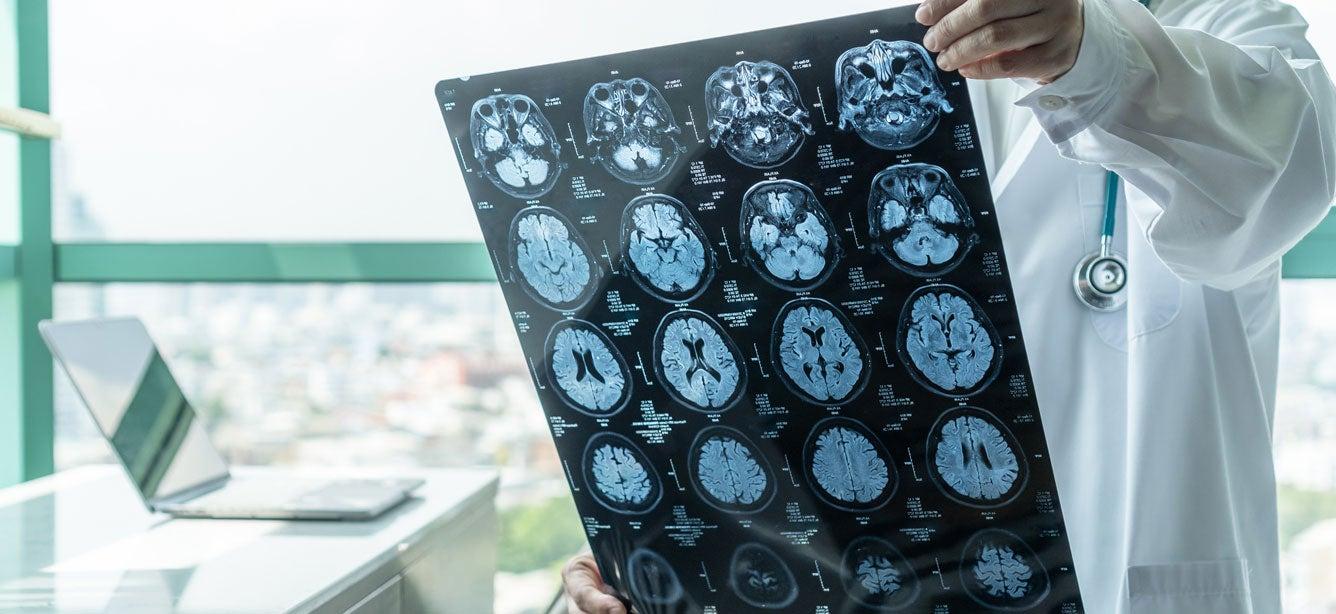
Related Topics
Part of healthy aging is staying on top of any changes in your body and mind that could make it harder to live an active life. That’s why it’s important to address one change that isn’t a natural part of aging: memory loss.
If you’re often lost in conversations, struggling with names, or constantly losing things, these may be signs of a condition called dementia.
What is dementia?
Dementia is a collective term for changes in your brain that damage memory, thinking, and decision-making skills you need to function in your daily life. As of 2023, 6.7 million people in the U.S. had dementia, and an estimated 14 million people will have it by 2060.1 Dementia is not a typical sign of aging, but adults may see symptoms start after age 60.1
What are signs of early dementia?
There are many changes in the ways you think, behave, and speak that can help you spot dementia symptoms early. The Alzheimer’s Association says to look for warning signs and symptoms that include:2
- Challenges in planning or solving problems. Usual tasks, such as cooking a meal, take longer to do. You find it hard to follow directions and lose track of numbers while paying bills.
- Confusion with time or place. You forget the day of the week. You may even forget where you are and how you got there.
- New problems with saying words. You may lose your place during a conversation or struggle to describe familiar objects.
- Decreased or poor judgment. You make poor decisions and neglect your personal appearance and hygiene.
- Changes in mood and personality. You may feel easily agitated, depressed, or anxious.
These symptoms may overlap and differ based on the type of dementia you have.
What are different types of dementia?
Dementia affects everyone differently and certain types are more common than others.
The following dementias are irreversible, but can be managed with medication:
- Alzheimer’s disease. Alzheimer’s disease makes up as many as 80% of all cases of dementia.3 It shrinks the brain from buildups of plaque and tangles from damaged nerve cells.4 Alzheimer’s often starts with forgetting recent information and can progress to issues with speech and behavior.
- Vascular dementia. Vascular dementia is the second most common type of dementia.5 It is caused by a block of blood flow and oxygen to the brain, often from a stroke. Symptoms can vary depending on the parts of the brain damaged from lack of blood, and repeat strokes can worsen the condition.3 It often coexists with other forms of dementia, such as Alzheimer’s and Lewy body dementia.6
- Lewy body dementia. Lewy bodies are bundles of protein in the brain that, over time, cause muscle stiffness, trembling, and slow movement. People with this dementia may have trouble sleeping and visions of people and objects that aren’t there.7
- Frontotemporal dementia. People with frontotemporal dementia lose nerve cells in their brain’s frontal and temporal lobes. These lobes control your ability to understand words and how you act around others. This can lead to inappropriate behavior, such as using offensive words, and can progress to losing the ability to walk, eat, and use the bathroom.8
- Mixed dementia. Mixed dementia is a combination of two or three types of dementia, and is most often Alzheimer’s disease mixed with vascular dementia.9 It is more common in adults ages 80 and older.3 More research is needed on specific symptoms because they overlap with different dementias.
What are the risk factors for dementia?
Your chances of developing dementia could go up depending on your background and lifestyle.
Some risk factors for dementia that you can control include:10
- Diet. Eat plenty of fresh vegetables, fruits, and fish, and consider following a Mediterranean diet of whole grains, nuts, and seeds.
- Exercise. Get regular physical activity by walking with a friend, walking your dog, or taking a dance class.11
- Sleep. Try going to bed at the same time each evening. Limit activities that keep you awake like watching TV and consuming drinks or food with alcohol or caffeine. Also talk to a doctor if you have sleep apnea—a disorder that disrupts your breathing during sleep12 (You might benefit from using a CPAP machine).
- Alcohol use. Cut back on drinking alcohol. Research shows heavy drinking could result in brain changes that could even lead to developing dementia before age 65, known as early onset dementia.10
- Chronic disease. Health issues such as diabetes, high cholesterol, and high blood pressure can spiral out of control if left unchecked. A healthy lifestyle and medication can manage these conditions.
Risk factors for dementia that you can't control include:10
- Age. The risk for developing dementia increases after age 65.
- Family history. There is a chance you could develop dementia if the condition runs in your family, especially if your parents or siblings have it. Genetic testing can reveal your likelihood of having certain kinds.3
- Race and ethnicity. According to the Centers for Disease Control and Prevention, Black older adults are twice as likely as white older adults to have dementia, while Hispanic older adults are 1.5 times as likely than white older adults to have dementia.3
- Down syndrome. Middle-aged people with Down syndrome—a genetic condition where someone is born with an extra chromosome—are at a higher risk of developing dementia.
- Traumatic brain injury. Another risk factor that may or may not be out of your control is traumatic brain injury or TBI. The risk for dementia goes up for people ages 50 or older with a TBI, and even more in the first six months to two years after having a TBI.10
How is dementia diagnosed?
A doctor can use a series of tests to figure out if your symptoms are a sign of dementia. But no single test will determine if you have it. Your doctor may first check your vitals, such as blood pressure, during a physical exam. Next, you may be asked questions about your medical history, daily routine, and mental health, such as:13
- Do you have a family history of dementia?
- When did your symptoms begin?
- What do you eat and how often do you exercise?
- Has your mood changed lately?
- Have you lost interest in activities you used to enjoy?
After a physical exam, you’ll be tested on your thinking skills and how well your brain communicates with the rest of your body. A doctor will examine your reflexes, speech, and ability to do simple tasks like memorizing a list.
The diagnostic tests for dementia will require a medical procedure
Brain imaging
Doctors may need to take detailed pictures of your brain, or brain scans. There are three types doctors use to detect signs of dementia:14
- Computed tomography scan: Also known as a CT scan. This scan can check for signs of a stroke or evidence of brain tumors.
- Magnetic resonance imaging: Also known as an MRI. In addition to checking for proof of stroke or tumors, MRIs can detect blood vessel damage and evidence of brain shrinkage.
- Positron emission tomography: Also known as a PET scan. These scans use radiation to highlight the brain’s structure. They are often used when CT and MRI results weren’t enough to reach a diagnosis.
Laboratory tests
A doctor may need to test your cerebrospinal fluid for evidence of dementias like Alzheimer’s disease. This fluid is inside the tissue surrounding your spinal cord and your brain. Doctors use a spinal tap—a needle in your spine—to collect the fluid.
Currently, there is no blood test approved by the U.S. Food and Drug Administration to diagnose dementia. However, lab blood work can still reveal underlying health issues, such as a vitamin deficiency, that may give you dementia-like symptoms.15
Is there a cure for dementia?
Most forms of dementia are neurodegenerative, meaning there’s no way to reverse damage to the brain. While there’s no dementia cure, there are targeted medicines to slow the progression of disease and manage symptoms.
Medical conditions such as low blood sugar and thyroid issues can cause dementia-like symptoms such as memory loss, but treatment can reverse those symptoms.10
How can I treat dementia?
Dementia is a complex condition to treat, but there are many drug and non-drug therapies available to help manage the symptoms:15
Prescription drugs
A doctor may prescribe the following drugs separately or together:
- Cholinesterase inhibitors: Taken orally, drugs such as donepezil and rivastigmine protect acetylcholine—a brain chemical that helps your judgment, thinking, and memory.16
- Glutamate regulators: Drugs such as memantine help you with reasoning, memory, and language skills by controlling glutamate—an acid that damages your brain.17 They’re taken by mouth and may be prescribed together with cholinesterase inhibitors.
- Aduhelm and Leqembi: These drugs are taken intravenously, or by IV, to slow the buildup of plaque in the brain found in Alzheimer’s disease. Users of Aduhelm (generic name aducanumab) must get an IV once a month18 versus every two weeks for people using Leqembi (generic name lecanemab).19 Your doctor must be part of an approved government registry to prescribe these drugs.21
Your doctor may prescribe additional drugs for other dementia symptoms such as insomnia and agitation. Each drug comes with potential side effects, and it’s important to talk with your doctor about the best treatment plan.
Occupational therapy
An occupational therapist is a health professional who looks for solutions to help you learn to live with your dementia as it progresses. They will give you strategies to cope with changing behaviors and help make your home safer to live in.
Clinical trials
A clinical trial tests the safety and effectiveness of new treatments that aren’t yet FDA-approved. Resources such as the Alzheimer’s Association’s TrialMatch can help link you with researchers who need volunteers for new medicines to treat symptoms or slow disease progression. Because these are not FDA-approved treatments, you should discuss these options with your health provider before participating.
Where can I find dementia care?
Care needs for someone with dementia can vary depending on the severity of symptoms, family dynamics, and affordability. Here are some options that may fit your loved one’s needs:21
In-home care
If you need help caring for someone with dementia in your own home, you can hire someone to help with daily tasks such as meal prep, bathing, and regular exercise. You may also need certified health care professionals to assist with giving medications and physical therapy.22
Adult day centers
Adult day centers offer social activities, exercise, and meals to people with dementia for several hours during the day. They give caregivers a chance to work another job, run errands or take a rest break from the demands of caregiving.23
Memory care
When you no longer have the resources to keep loved ones with dementia safe in their own home, it may be time to consider memory care. This long-term residential specialty care is staffed by people trained in dementia care. These facilities have higher levels of supervision and security for residents whose symptoms include wandering.24
Memory care specialists may also work at assisted living facilities. These are residential communities where older adults have their own room or apartment, but can still socialize in shared living spaces and get help with basic activities of daily living like dressing and bathing.
Consider your loved one’s specific health needs before reaching out for help. Do your research on what is the best fit for your family, and ask care providers questions about their experience working with people with dementia. Use resources such as the U.S. Administration on Aging’s Eldercare Locator to find help where you live.
How do I pay for dementia care?
Between medications, specialists, and housing, the costs of dementia care can add up over time. Alone, the average cost of staying in a U.S. memory care facility is over $6,000 a month.25 But there are many options to help you afford a better quality of life:
Medicare
Medicare, a federally funded health insurance program for adults age 65 and older, may cover the costs of in-home care services based on certain conditions, such as a person with dementia unable to leave their home.26 Medicare's online search tool Home Health Compare is a free resource for caregivers looking for in-home care.
Medicare does not cover the cost of adult day services or staying at a long-term memory care facility. But under certain conditions, Medicare will cover hospital care, a stay of up to 100 days in a nursing home, and prescription drugs.27
Medicare Part D prescription plans are required to cover multiple brands of cholinesterase inhibitors and glutamate regulators.28 To take Alzheimer’s disease drugs like Aduhelm or Leqembi, Medicare enrollees must have the following:29
- An official diagnosis of mild cognitive impairment or mild Alzheimer’s disease dementia
- A doctor in an approved registry that includes a clinical team and follow-up care
Medicaid
Medicaid, a state and federal insurance program for Americans with low incomes, can help pay for in-home dementia care through its Home and Community-Based Services program. The program also provides services, such as help with medication, to people in adult day centers and Medicaid-approved long-term care facilities.30
Medicaid may cover 100% of the cost of a nursing home stay. It typically will not cover the full cost of room and board at an assisted living facility. Some state Medicaid programs do offer waivers to help you pay for room and board at assisted living facilities.31
The level of Medicaid coverage for dementia care varies from state to state. For example, Medicaid may not cover additional fees for recreational activities at adult day centers.32 Contact your state Medicaid agency to see what your options are.
Veteran benefits
The VA Health System offers eligible veterans access to dementia care such as long-term care facilities and adult day services.33 Find a VA social worker in your area to discuss your options.
If you’re a veteran receiving a VA pension, the VA offers two kinds of monthly payments to afford memory care help: Aid and Attendance benefits and Housebound benefits.34 Veteran spouses and unmarried dependent children who receive VA pensions can also get these benefits.
You are eligible for Housebound benefits if a permanent disability forces you to spend most of your time inside your home. For Aid and Attendance benefits, you must meet at least one of these requirements:34
- You are mostly in bed because of an illness
- You need help with activities of daily living like dressing and bathing
- You have trouble seeing even with glasses or contact lenses
- You are staying in a nursing home due to a disability
The VA only allows you to receive one of these benefits. Contact your local VA office about how to apply.
Long-term care insurance
Long-term care insurance policies can help reimburse you for memory care-related costs, such as skilled nursing care. Look for a policy when you are between ages 55 and 65, if possible, as insurance companies are less likely to insure you after age 70.35 Do your homework on how much coverage you need, what you can afford, and whether your insurer is licensed in your state.
Private assets
Social Security income and personal loans from family and friends can help pay for dementia care costs. You may be able to use money from individual retirement accounts, or IRAs, and from your pension plan before reaching retirement age if you meet certain disability requirements. There may be tax penalties for taking money from retirement accounts before you retire, so talk with the companies managing your plans about your options.36
Community resources
There may be local organizations that provide services such as meal delivery and adult recreation for free or at a discount.36 Search through the National Council on Aging’s BenefitsCheckUp or your local Alzheimer’s Association chapter to find help near you.
Learn the benefits and risks of these payment options and others in NCOA’s guide to Medicare’s coverage of memory care.
Sources
1. Centers for Disease Control and Prevention. About Alzheimer’s Disease. Found on the Internet at https://www.cdc.gov/aging/alzheimers-disease-dementia/about-alzheimers.html
2. Alzheimer’s Association. 10 Early Signs and Symptoms of Alzheimer's and Dementia. Found on the Internet at https://www.alz.org/alzheimers-dementia/10_signs
3. Centers for Disease Control and Prevention. About Dementia. Found on the Internet at https://www.cdc.gov/aging/dementia/index.html
4. Alzheimer’s Association. Inside the Brain. Found on the Internet at https://www.alz.org/alzheimers-dementia/what-is-alzheimers/brain_tour_part_2
5. Alzheimers.gov. What is Vascular Dementia? Found on the Internet at https://www.alzheimers.gov/alzheimers-dementias/vascular-dementia
6. Alzheimer’s Association. Vascular Dementia. Found on the Internet at https://www.alz.org/alzheimers-dementia/what-is-dementia/types-of-dementia/vascular-dementia
7. Alzheimer’s Association. Dementia with Lewy Bodies. Found on the Internet at https://www.alz.org/alzheimers-dementia/what-is-dementia/types-of-dementia/dementia-with-lewy-bodies
8. Alzheimer’s Association. Frontotemporal Dementia. Found on the Internet at https://www.alz.org/alzheimers-dementia/what-is-dementia/types-of-dementia/frontotemporal-dementia
9. Alzheimer’s Association. Mixed Dementia. Found on the Internet at https://www.alz.org/alzheimers-dementia/what-is-dementia/types-of-dementia/mixed-dementia
10. Mayo Clinic. Dementia: Symptoms & Causes. Found on the Internet athttps://www.mayoclinic.org/diseases-conditions/dementia/symptoms-causes/syc-20352013
11. Alzheimer’s Association. Stay Physically Active. Found on the Internet at https://www.alz.org/help-support/brain_health/stay_physically_active
12. Mayo Clinic. Alzheimer's: Managing sleep problems. Found on the Internet at https://www.mayoclinic.org/healthy-lifestyle/caregivers/in-depth/alzheimers/art-20047832
13. Alzheimer’s Association. Medical Tests for Diagnosing Alzheimer’s. Found on the Internet at https://www.alz.org/alzheimers-dementia/diagnosis/medical_tests
14. Medical News Today. What to know about brain scans for dementia. December 8, 2023. Found on the Internet at https://www.medicalnewstoday.com/articles/brain-scan-for-dementia
15. Mayo Clinic. Dementia: Diagnosis & Treatment. Found on the Internet at https://www.mayoclinic.org/diseases-conditions/dementia/diagnosis-treatment/drc-20352019
16. Alzheimer’s Association. Medications for Memory, Cognition and Dementia-Related Behaviors. Found on the Internet at https://www.alz.org/alzheimers-dementia/treatments/medications-for-memory
17. National Library of Medicine. Alzheimer's disease: Does memantine help? Found on the Internet at https://www.ncbi.nlm.nih.gov/books/NBK279356/
18. NCOA. What You Need to Know About Aduhelm. Found on the Internet at https://www.ncoa.org/article/what-you-need-to-know-about-aduhelm
19. NCOA. Leqembi and Alzheimer's Disease: Benefits, Side Effects, and What It Costs. Found on the Internet at: https://www.ncoa.org/article/leqembi-and-alzheimers-disease-the-benefits-side-effects-and-what-it-costs
20. Centers for Medicare & Medicaid Services. CMS announces plan to ensure availability of new Alzheimer’s drugs. https://www.cms.gov/newsroom/press-releases/cms-announces-plan-ensure-availability-new-alzheimers-drugs
21. Alzheimer’s Association. Care Options. Found on the Internet at https://www.alz.org/help-support/caregiving/care-options
22. Alzheimer’s Association. In-Home Care. Found on the Internet at https://www.alz.org/help-support/caregiving/care-options/in-home-care
23. Alzheimer’s Association. Adult Day Centers. Found on the Internet at https://www.alz.org/help-support/caregiving/care-options/adult-day-centers
25. Dementia Care Central. Alzheimer’s / Dementia Care Costs: Home Care, Adult Day Care, Assisted Living & Nursing Homes. Feb. 9, 2023. Found on the internet at https://www.dementiacarecentral.com/assisted-living-home-care-costs/#assisted-living
26. Alzheimer’s Association. In-Home Care. Found on the Internet at https://www.alz.org/help-support/caregiving/care-options/in-home-care
27. NCOA. Does Medicare Cover Memory Care? A Comprehensive Guide. Found on the Internet at https://www.ncoa.org/article/does-medicare-cover-memory-care-a-comprehensive-guide
28. NCOA. What Does Medicare Cover for Alzheimer’s Disease?Found on the Internet at https://www.ncoa.org/article/what-does-medicare-cover-for-alzheimers-disease
29. Centers for Medicare & Medicaid Services. CMS announces plan to ensure availability of new Alzheimer’s drugs. https://www.cms.gov/newsroom/press-releases/cms-announces-plan-ensure-availability-new-alzheimers-drugs
30. NCOA. Does Medicaid Cover Memory Care? Found on the Internet at https://www.ncoa.org/article/does-medicaid-cover-memory-care
32. Alzheimer’s Association. Adult Day Centers. Found on the Internet at https://www.alz.org/help-support/caregiving/care-options/adult-day-centers
33. U.S. Department of Veterans Affairs. Geriatrics and Extended Care. Found on the. Internet at https://www.va.gov/GERIATRICS/pages/
34. U.S. Department of Veterans Affairs. VA Aid and Attendance benefits and Housebound allowance. Found on the Internet at https://www.va.gov/pension/aid-attendance-housebound
35. American Association for Long-Term Care Insurance. Long-Term Care Insurance Facts - Data - Statistics - 2022 Reports. Found on the Internet at https://www.aaltci.org/long-term-care-insurance/learning-center/ltcfacts-2022.php
36. Alzheimer’s Association. Paying for Care. Found on the Internet at https://www.alz.org/help-support/caregiving/financial-legal-planning/paying-for-care


